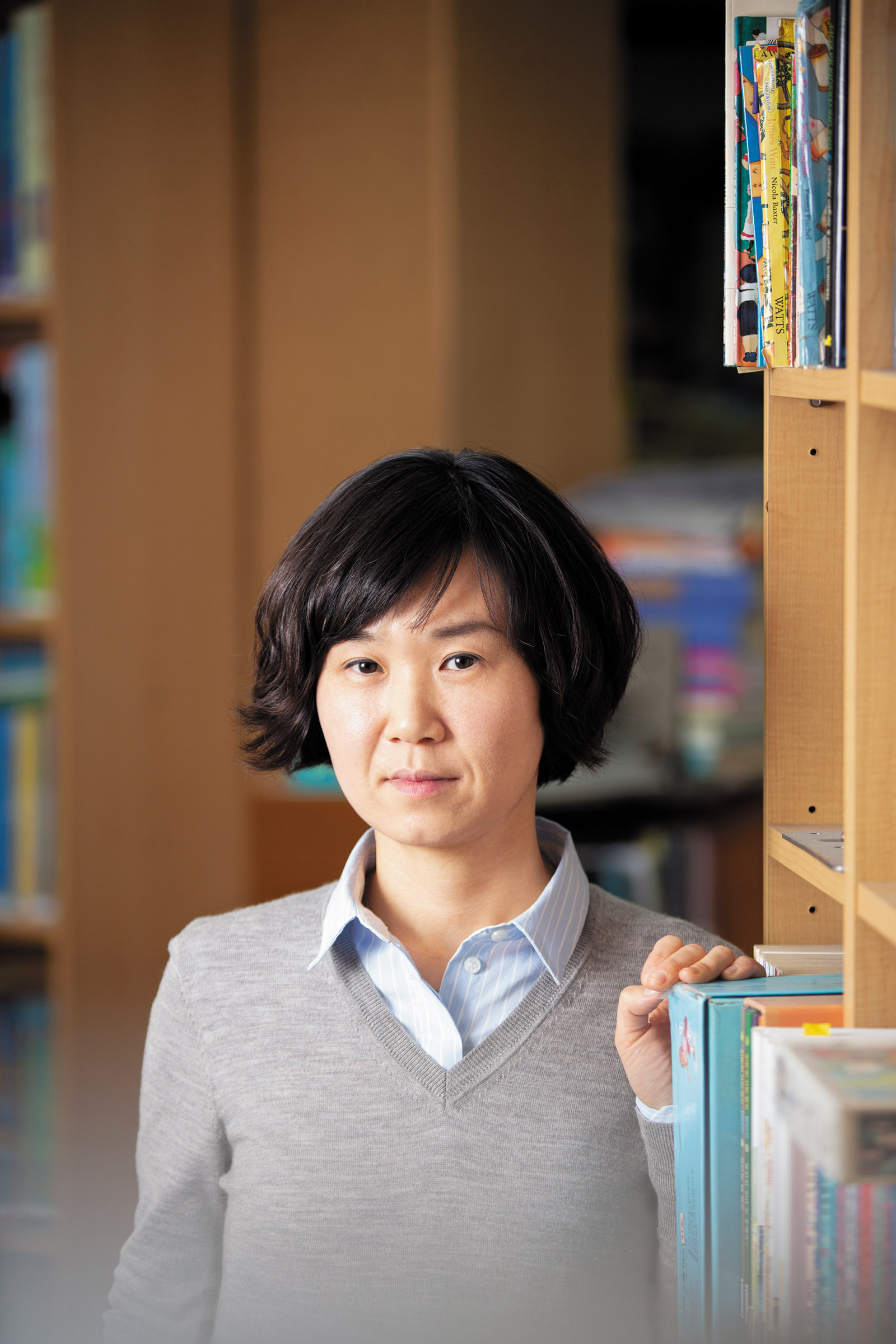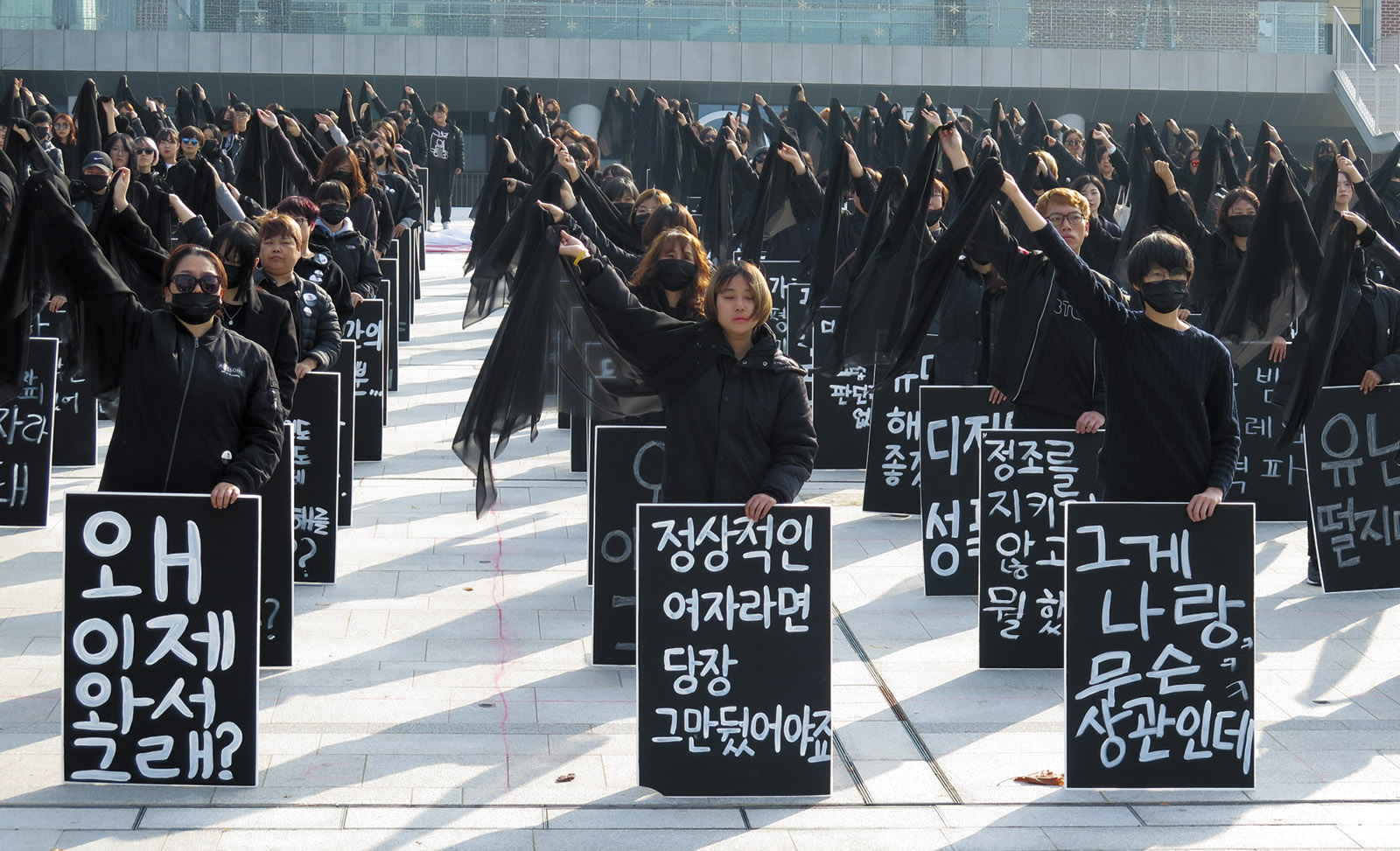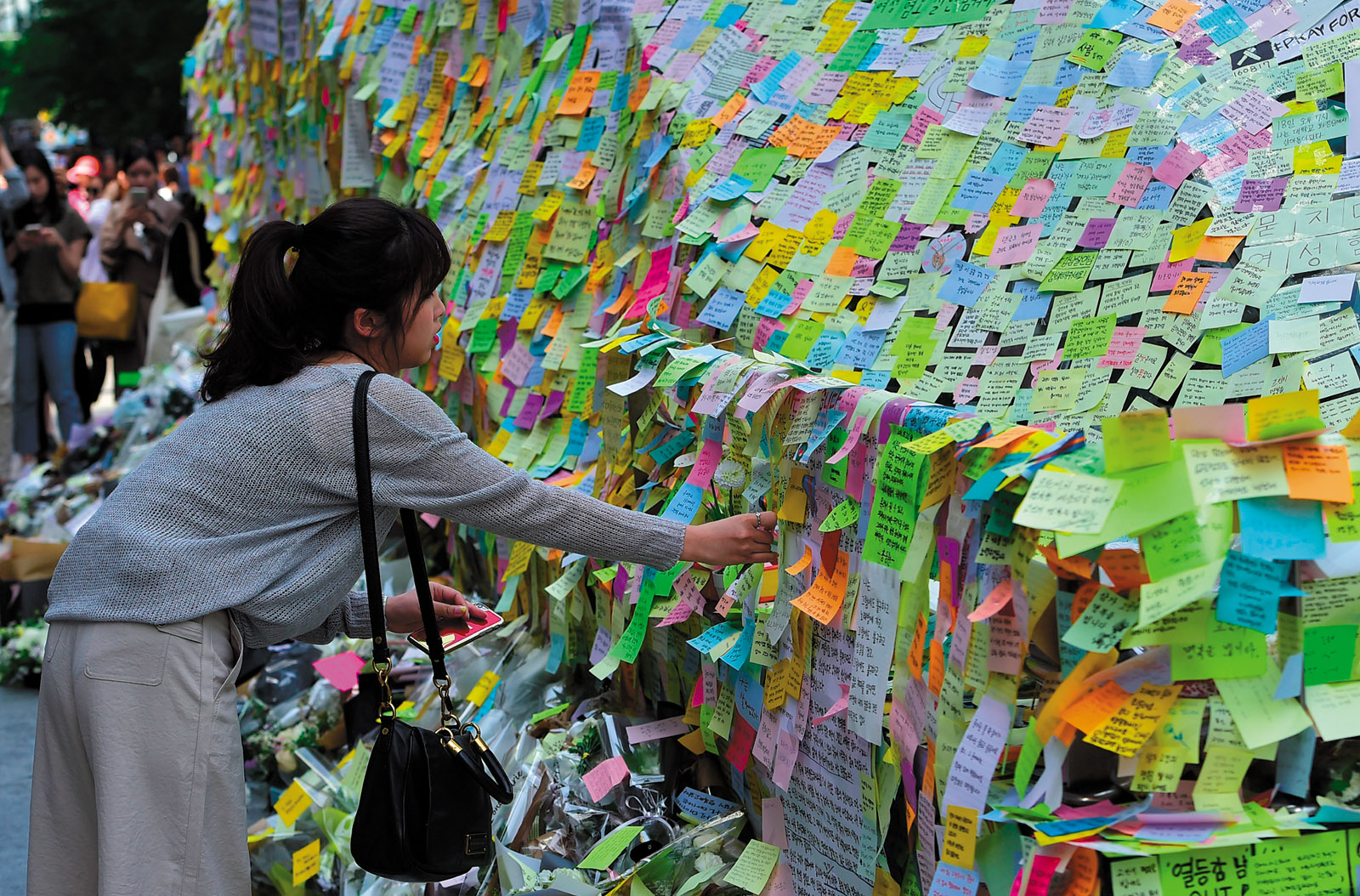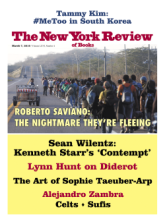In October 2016 the Korean publishing house Minumsa released a short novel called Kim Ji-young, Born in 1982, the latest in a series of works of fiction by “today’s young writers.” The author is a former television scriptwriter, Cho Nam-joo, born in 1978, who had published well-received short stories. She wrote the novel in two months, inspired by her favorite English-language writer, Rebecca Solnit, and maddened by the turns her own life had taken as a Korean woman and the treatment she faced as a new mother. One day, while taking a coffee break with her baby, she heard male passersby refer to her as 맘충, or “mom-worm,” a nasty epithet for mothers who have the gall to leave their homes.
The name in the book’s title, “Kim Ji-young,” is the Korean equivalent of “Jane Doe,” an everywoman. The novel has sold a million copies, one for every fifty people in South Korea. It’s been touted by celebrities and was given to President Moon Jae-in by another prominent politician. There are plans to translate it into eighteen languages, including English (the Japanese version quickly became a best seller), and it will soon be turned into a film. Park Hye-jin, the editor at Minumsa who acquired Kim Ji-young, told me that the novel’s virtue lies in its broad social impact. It promises that “if we speak up, even quietly,” she said, “these issues won’t revert back to being individual problems.”
Several fiction writers I spoke with called the book “middling” and “uninteresting” as literature, yet its very accessibility may be its source of power for many readers. The diction is simple, the writing artless; the world of the novel, told in a basic third-person voice, claustrophobic. To read the book is to imagine being a restive, aggrieved millennial and to trace her path through everyday misogyny.
It is curious that a book not primarily focused on sexual violence has become a cultural touchstone for Korea’s version of the Me Too movement. But the local activism grouped under the American label of Me Too must be understood as a total rebellion against deeply patriarchal, Confucian structures that, in the digital era, have found cruel new forms.
In 2015, two years before the Harvey Weinstein revelations in the US, a police crackdown on Soranet, an illicit porn site, forced Koreans to confront a terrible reality. Porn is illegal in Korea, and thus exchanged through underground networks—this was nothing new—but consumers were now downloading countless images of women and girls that had been obtained secretly, without their consent. Revenge porn and footage from spy cameras in women’s bathrooms and changing rooms were being streamed on smartphones and bought and sold on various websites, on a scale few had previously understood. In 2004, in response to an earlier epidemic of Peeping Tom photography, the government had banned the disabling of the camera-shutter sound on Korean cell phones. But the regulation was less effective for video. Across the country, it’s common to see women’s bathroom stalls whose every crack and crevice is plugged with tiny wads of toilet paper.
Soranet was shut down; other, similar sites proliferated. The spy-cam revelations prompted fear and indignation, but not quite a mass movement. Though Korean feminists continued to organize—against not only revenge porn and spy-cam photography and video, but also domestic violence, misogyny in the media, and the longstanding criminalization of abortion and sex work—it would take a murder, the following year, to move these concerns to the center of Korean life.
On May 17, 2016, a thirty-four-year-old man stabbed a twenty-three-year-old woman to death in the middle of Gangnam, a crowded, prosperous neighborhood of Seoul. He had lurked in a public bathroom outside a noraebang, a Korean karaoke parlor, waiting for a woman, any woman, to enter. When he was arrested for the crime, he reportedly told the police, “Women have always ignored me.”
Within days, the glass subway entrance closest to the crime scene—Gangnam Station, Exit 10—was rendered opaque by countless Post-it Notes bearing messages of solidarity: “I am also a twenty-three-year-old woman…. How terrible to live in fear just for being female.” “I survived by luck. That could’ve been me.” “What happened to you happened to me.” Yerin Moon, a twenty-seven-year-old who works for the Korea Women’s Hotline, told me that the Gangnam murder turned her into a feminist: “I’ve probably been to seven or eight protests since,” she said.
Through the summer and fall of 2016, a consciousness born of outrage spread among South Korean women and girls, dovetailing with the mass Candlelight Movement that would bring down President Park Geun-hye.* That October, Tak Soo-jung, an employee at a publishing house, publicly accused her former poetry teacher of sexual abuse and encouraged other women to speak out on social media. Not all of them identified as feminist, an affiliation that attracts suspicion in Korea’s traditional society, but their basic demands—for physical safety, equal opportunity, and freedom from oppressive standards of femininity—were shared and discussed widely. Why, they asked, did men get all the good jobs? Why should women have to do all the parenting and household chores, and “fix” their faces—that is, get plastic surgery—to get ahead? Why should they tolerate being ogled at the office and forced to pour after-work drinks for their male bosses and colleagues?
Advertisement
In Kim Ji-young, Born in 1982, the eponymous heroine grows up in an era that is only slightly more enlightened than that of her mother, who was expected to quit school and work in a factory to pay her brothers’ tuition. We meet Kim Ji-young in 2015, on the autumnal holiday of Chuseok, when she is thirty-three years old. Following Korean custom, she and her husband and infant daughter have gone to visit his side of the family, and there is no shortage of work—cooking, cleaning, and serving—for the women.
Chuseok traditionally marks the fall harvest, and though most Koreans now live in high-rise apartments and buy their kimchi from the grocery store, they still submit to an annual ritual of interstate gridlock and gluttonous meals with relatives. This year, exhausted and provoked by her mother-in-law—“Cooking to feed your family? That’s not work!… Hey, you’re not tired, are you?”—Ji-young reaches her breaking point. She lashes out, but quietly, with a creepy, placid stare. She impersonates her own mother and says, sarcastically, to her mother-in-law, “Actually, Ma’am, my dear daughter Ji-young gets sick every time the holidays roll around.” She addresses her angry father-in-law in the same fashion. Ji-young’s embarrassed husband apologizes, clamps his hand over his wife’s mouth, and drags her out to the car. My translation and summary are inadequate—this may read as standard family bickering to a Western audience—but Ji-young’s behavior represents a scandalous transgression of Korean norms.
What pushes a woman to the brink? When does anger begin to look like madness? Chapter 2 rewinds to Ji-young’s childhood in a traditional, Confucian home: there’s Ji-young, her older sister, younger brother, father, mother, and paternal grandmother. The father is a civil servant; the mother cooks, cleans, caters to her mother-in-law, and takes in industrial piece work (sewing, assembly, and packaging) to pad her husband’s meager salary. Ji-young’s brother is treated like a prince. He gets his own room, eats better food, and wears finer clothes than his sisters. He might, in fact, have had a third older sister, were it not for his mother’s secret decision to abort a female fetus. “Nothing was Mother’s choice, but everything was her responsibility,” the narrator observes. “She was sick, in body and soul, but had no one to comfort her.”
In Ji-young’s crowded elementary school, boys eat lunch first, forcing girls to rush through a second-shift meal. In junior high, under the pretext of checking uniforms, pervy teachers poke breasts and lift up skirts, and one of Ji-young’s male classmates becomes a frightening stalker. Young women help one another, through whisper networks and rebellious schemes hatched in the schoolyard, but find themselves blamed by parents and teachers for being both too weak and too strong. “Why,” Ji-young’s father yells when he learns of the stalker, is his daughter “such a promiscuous socializer? Why is her skirt so short?”
We follow Ji-young to college and into a job market with few opportunities, all of them sharply gendered. In one of the book’s darkly funny scenes, Ji-young at last gets an interview but finds two identical competitors in the waiting room: “All three have their hair cut to an ear-length bob, pinkish lipstick, and dark-grey suits, as if agreed upon in advance.” A male manager interviews them together and asks a hypothetical question: “You’re out to meet with a corporate client, and a bigwig gets handsy. He rubs your shoulders and keeps touching your thigh, you know what I mean. So what would you do?” Ji-young is horrified but responds mildly: “I would excuse myself by going to the bathroom or fetching some documents.”
A few days later, when she receives a rejection by e-mail, she calls the office to ask for feedback. “It probably just wasn’t a good fit,” the human resources manager tells her. Ji-young hangs up and thinks, “Damn, if I wasn’t going to get it anyway, I should’ve just said what I felt.” She stands in front of a mirror and imagines herself back in the interview, being asked how she would respond to the handsy client. “I’d break that son of a bitch’s fucking wrist!” she yells, and then tells the interviewer, “You’re part of the problem, too. Asking a question like that is itself sexual harassment. You’d never say that to a man!”
Advertisement
Ji-young is eventually hired as a clerk in a public-relations firm, where she loves the work but must deal with the schmooze and booze of Korean corporate culture. At a dreaded hwaeshik, or after-work gathering, a client pours Ji-young one beer after another, tells her she’d be even more beautiful with double-eyelid surgery, and asks if she has a boyfriend. She gets through it with the support of her office mentor, a female executive who has endured years of come-ons, assumed more than her share of overtime and business trips, and took just a month off after having a baby. (Outside the US this is rightly seen as unacceptably brief.) The executive fights to extend the maternity-leave policy and looks after younger women in the office, but still they quit, overwhelmed by the demands of what the American sociologist Arlie Hochschild long ago called the “second shift”: the domestic labor that begins “after work.”
Kim Ji-young, too, succumbs to this pattern. She marries and gets pregnant, quitting her job to assume the role of primary caregiver. When her husband repeatedly promises to “help out a lot,” her bile rises. “Stop already with the ‘helping’ bullshit,” she says. “You’ll help with chores, you’ll help raise the kid, you’ll help with my work. Is this not your house? Your housework? Your kid?… You act like you’re doing me a huge favor.”
She gives birth to a daughter amid the national epidemic of spy-cam pornography, including at her old office. Within a year, beset by child-care duties, housekeeping chores, boredom, and isolation, she becomes depressed. One day she treats herself to coffee and a stroll in the park with her daughter, only to hear two men mock her—just as happened in the author’s life. The book ends in 2016, after Ji-young’s rebellion on Chuseok, where the story began. She is taking antidepressants and seeing a shrink twice a week, a man who prides himself on his deep understanding of the female psyche. His own wife had given up her medical career to raise their son and then lost her mind. And yet, when one of his female employees quits in the middle of a difficult pregnancy, he resolves never again to make such a hire. “Regardless of how good a woman was, the baby issue would always be a huge headache,” he thinks. “Next time, it’d be best to recruit an unmarried woman.” This is how Cho Nam-joo concludes the novel—not in the body of Kim Ji-young, but in the mind of her sexist therapist. Patriarchy gets the last word.
When I was last in Seoul, home to a fifth of South Korea’s population, I thought often of Kim Ji-young. The adolescent Ji-youngs rushing to school, knapsacks flapping; the twenty-something Ji-youngs on their lunch break, IDs hanging from lanyards around their necks; the thirty-something Ji-youngs carrying infants up subway stairwells. The book made me recall a colleague from the early 2000s, when I worked at a Korean museum. She was fluent in three languages and just out of a prestigious post-doctorate program, yet was still expected to fetch coffee for our boss.
In October, I stopped by a protest attended by two hundred feminists, LGBT activists, and migrant workers. They carried bright pink signs calling for a law that would bar discrimination based on gender, sexual orientation, age, disability status, and race. As they marched from Gwanghwamun Square, near the presidential residence, toward the National Assembly, I chatted with a sociologist who teaches at a local women’s college. In 2014, she said, hardly anyone signed up for her course on “sex and culture”; since 2016, the class has been oversubscribed. Her students had all read, and raved about, Kim Ji-young, Born in 1982, which she regarded as a useful introduction to feminist thought.
Two years after its publication, the novel was still displayed prominently in bookstores in Seoul and other large Korean cities. On a visit to the Korea Sexual Violence Relief Center, one of the first women’s shelters in the country, I found a copy squeezed between volumes on feminist theory and history. Roh Sun Yi, an organizer with the relief center who was herself born in 1982, said that when she read it for the first time, “It didn’t feel like a novel. It felt like a diary. It was as though someone involved in feminist activism had written a book just for us.” New volunteers to Roh’s group are asked to read and discuss the novel as part of their training seminar.
In January 2018, an attorney named Seo Ji-hyun, who had faced years of retaliation for reporting sexual harassment and rebuffing the advances of Ahn Tae-geun, the former chief of the elite Seoul prosecutors’ office, told her story on the nightly news. (Ahn has since been found guilty of abuse of power and sentenced to two years in prison.) That February, a poem titled “Monster,” by Choi Young-mi, published in the Hwanghae Review literary journal, went viral. Virtually every Korean news outlet described the poem as an accusation of molestation, coerced sex, and harassment (“He touches every young girl he sees”) against the poet Ko Un, now eighty-five and long considered Korea’s best hope for a Nobel Prize in Literature.
Other famous men were soon named in the press: the theater director Lee Yoon-taek (who has since been imprisoned for sexual assault), the film director Kim Ki-duk, the actor Cho Jae-hyun, and, perhaps most consequentially, Ahn Hee-jung, a liberal provincial governor who was expected to succeed Moon Jae-in as president. Thousands of ordinary women and men began to invoke the English-language hashtags #MeToo and #WithYou, drawing a line from the Gangnam murder and spy-cam porn to Harvey Weinstein, Ahn Tae-geun, and Ahn Hee-jung.
On the two-year anniversary of the Gangnam murder last May, a rally for government accountability on sex crimes, initiated online, drew 15,000 people to the Daehangno neighborhood in central Seoul. It was among the largest women-centered protests in Korean history and was soon repeated and eclipsed—some 60,000 people showed up for a follow-up rally in early July, and the protests have continued, nicknamed 불편한 용기, or “Uncomfortable Courage.” (Two activists I spoke with, though, accused the gathering of excluding trans women.) In June Shin Ji-ye, a twenty-eight-year-old Green Party leader, ran for mayor of Seoul on an overtly feminist platform, and finished, impressively, in fourth place. Lee Sunhee, the director of Face, the Other Side, a documentary about Internet-mediated sexual violence, told me, “I’ve been doing this activism for thirty years, and never seen such power and organization.”
As in the US, however, a cultural and legal backlash—including a number of comeback attempts and retaliation in the courts—is underway. I’ve heard many men, in Seoul and New York, joke about which actions might get them “Me Too’d,” and complain of being denied access to women-only discussions and events. Last summer, Ahn Hee-jung was found not guilty of sexual assault and sexual harassment. The testimony of his former secretary, Kim Ji-eun, had clearly shown how a power gap can lead to physical and verbal abuse of low-ranking workers, but the court found her testimony insufficiently credible. Supporters of Kim filled the streets, holding red signs that read, “Ahn Hee-jung is guilty! #MeToo #WithYou.” An appeals court eventually agreed: on February 1, it reversed Ahn’s acquittal, sentencing him to three and a half years in prison.
Ko Un, the Nobel contender, never faced criminal prosecution, but he filed a defamation suit against Choi Young-mi, claiming nearly $1 million in damages caused by the publication of “Monster” and Choi’s subsequent media appearances. (A court ruling is expected on February 15.) Jeon Seong-won, the editor who commissioned Choi’s poem for an annual feminist edition of the Hwanghae Review, stands by the poem. As soon as it came in, he told me, he knew it would stir up an intelligentsia long shielded from accountability: “In Korean society, the literary world holds a sacred status, a hallowed place in elite culture.”
Several months ago, the fiction writer Hwang Jungeun published an essay titled “Scar” in another Korean literary magazine. It is ostensibly a review of Roxane Gay’s book Hunger but, as Hwang explains, “Some personal stories demand a personal story in return.” As she read Gay’s book, she felt an old trauma rise to the surface. In fifth grade Hwang was raped by a cousin about five years her senior. “When a woman bears detailed witness to an event from three or six or ten years ago, we assume it’s an embroidery, a lie or delusion, or a creation,” Hwang writes, in a passage that brings to mind Christine Blasey Ford, who accused Supreme Court Justice Brett Kavanaugh of sexual assault. “But I remember that night.”
I met with Hwang for a cup of tea in downtown Brooklyn. Korea’s Me Too, she told me, is a braid of many social justice movements, all of them “connected through patriarchy.” She said its concerns range from the mundane (sexist textbooks, imbalanced marital expectations) to the existential (the Gangnam murder), but what’s essential is that “women are coming together and realizing that what they’d been feeling individually is actually much broader, and shared.” I imagine the million Korean copies of Kim Ji-young, Born in 1982 as a kind of membership card or printed creed—proof of a collective experience too often demeaned. In Hunger, Hwang notes, Gay speaks of a body’s “before and after”—of trauma as a dividing line. The harrowing gift of Me Too is the knowledge that so many of us, around the world, live in this “after.”
—February 7, 2019
-
*
See my “Moon Over Korea,” The New York Review, August 16, 2018. ↩






